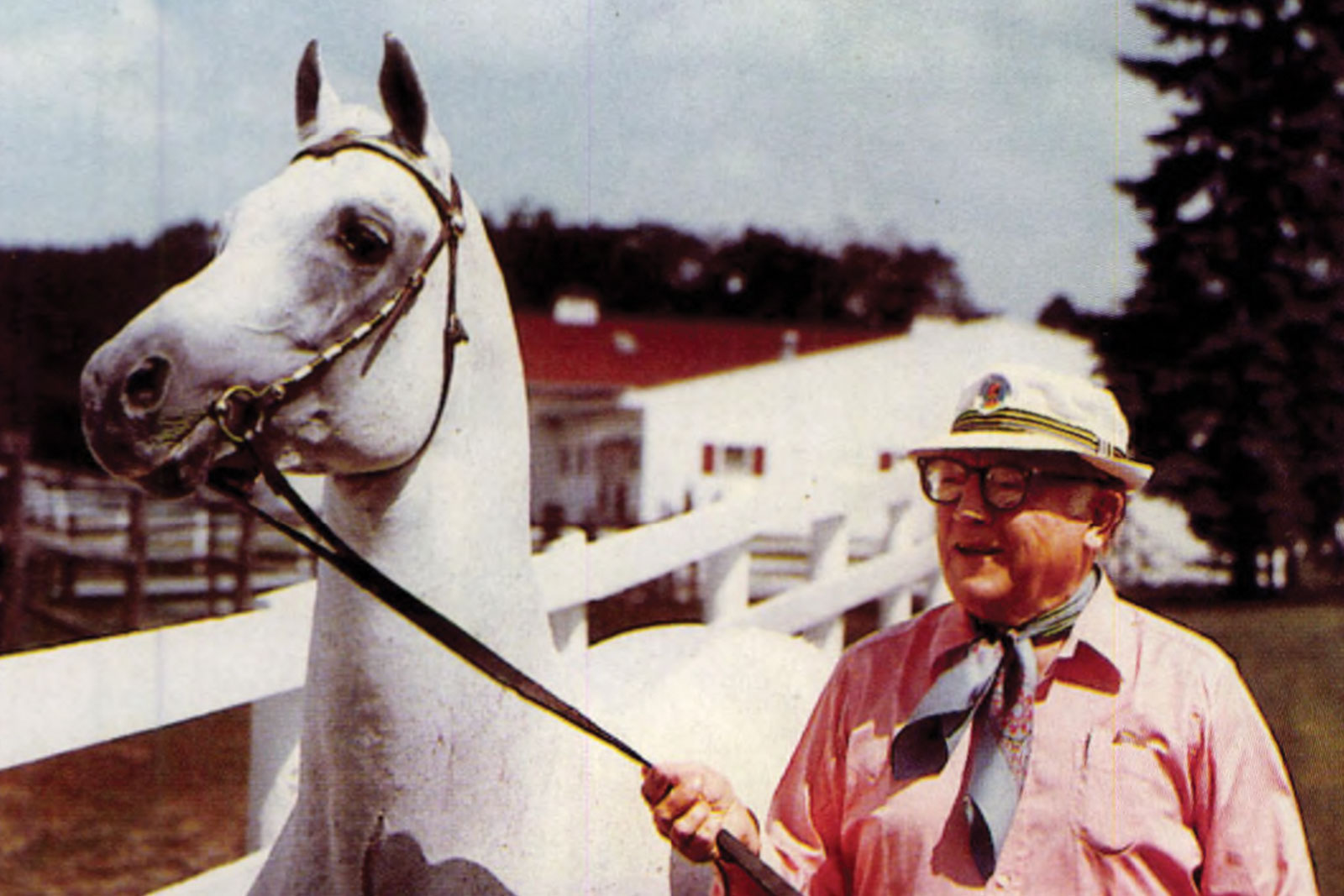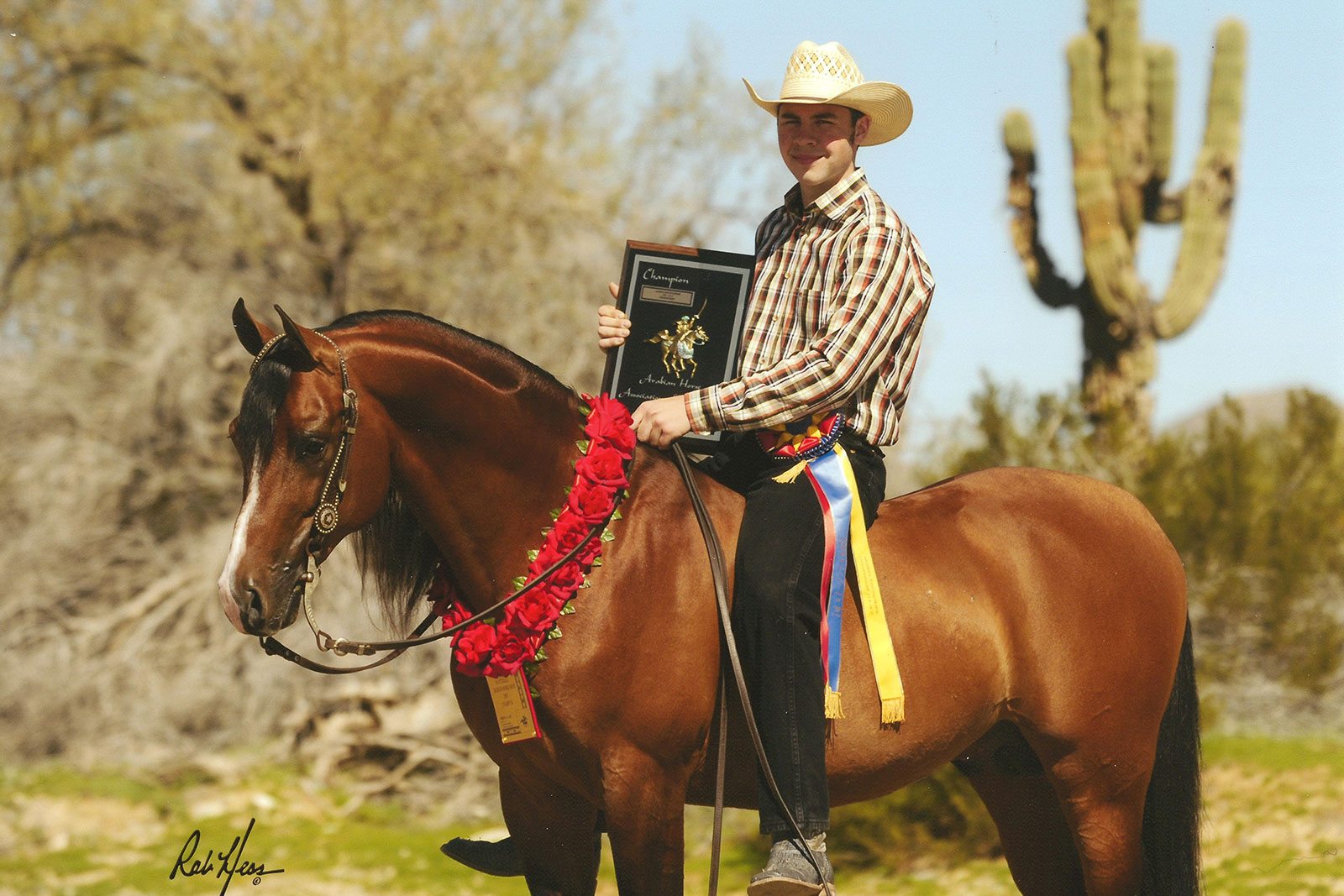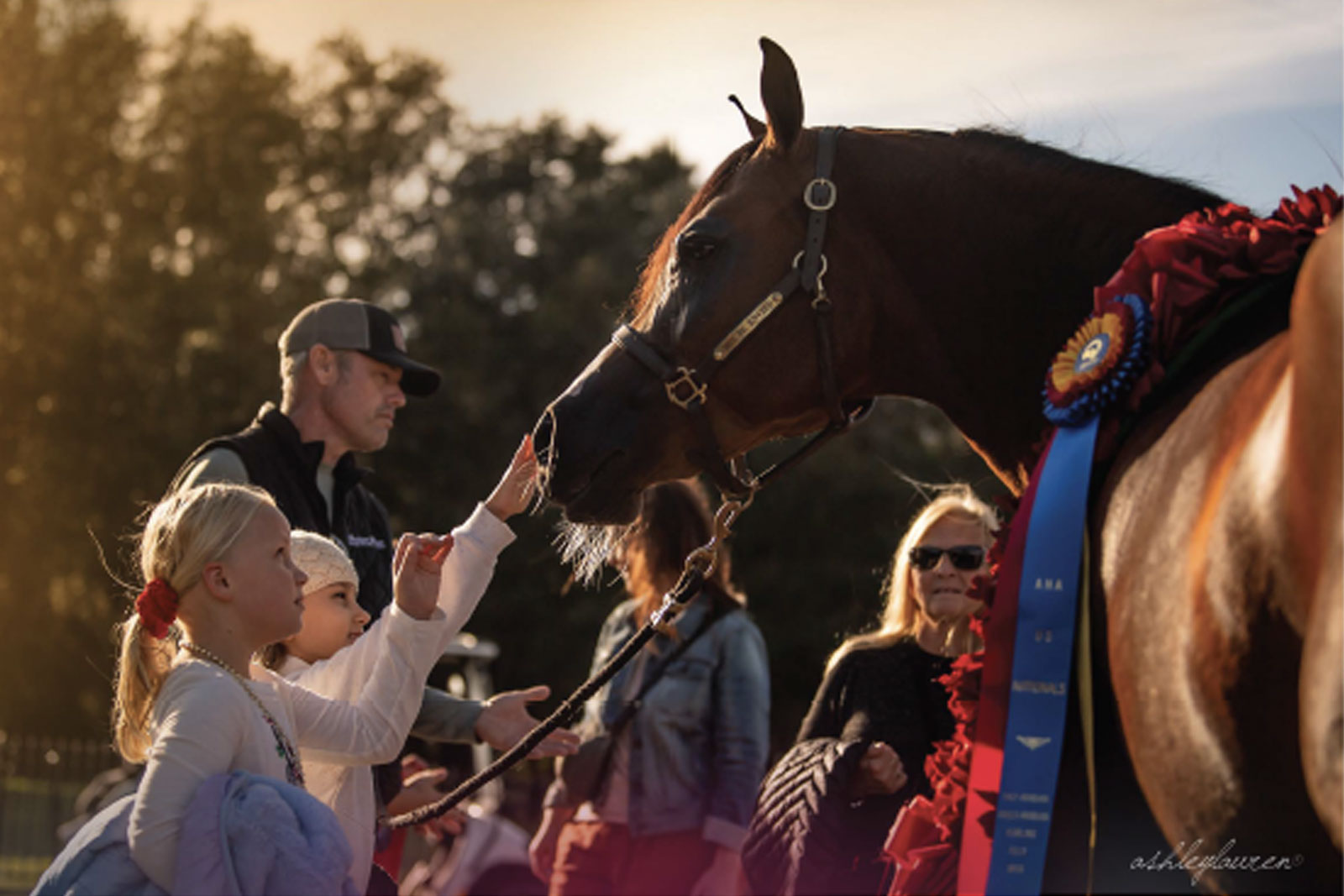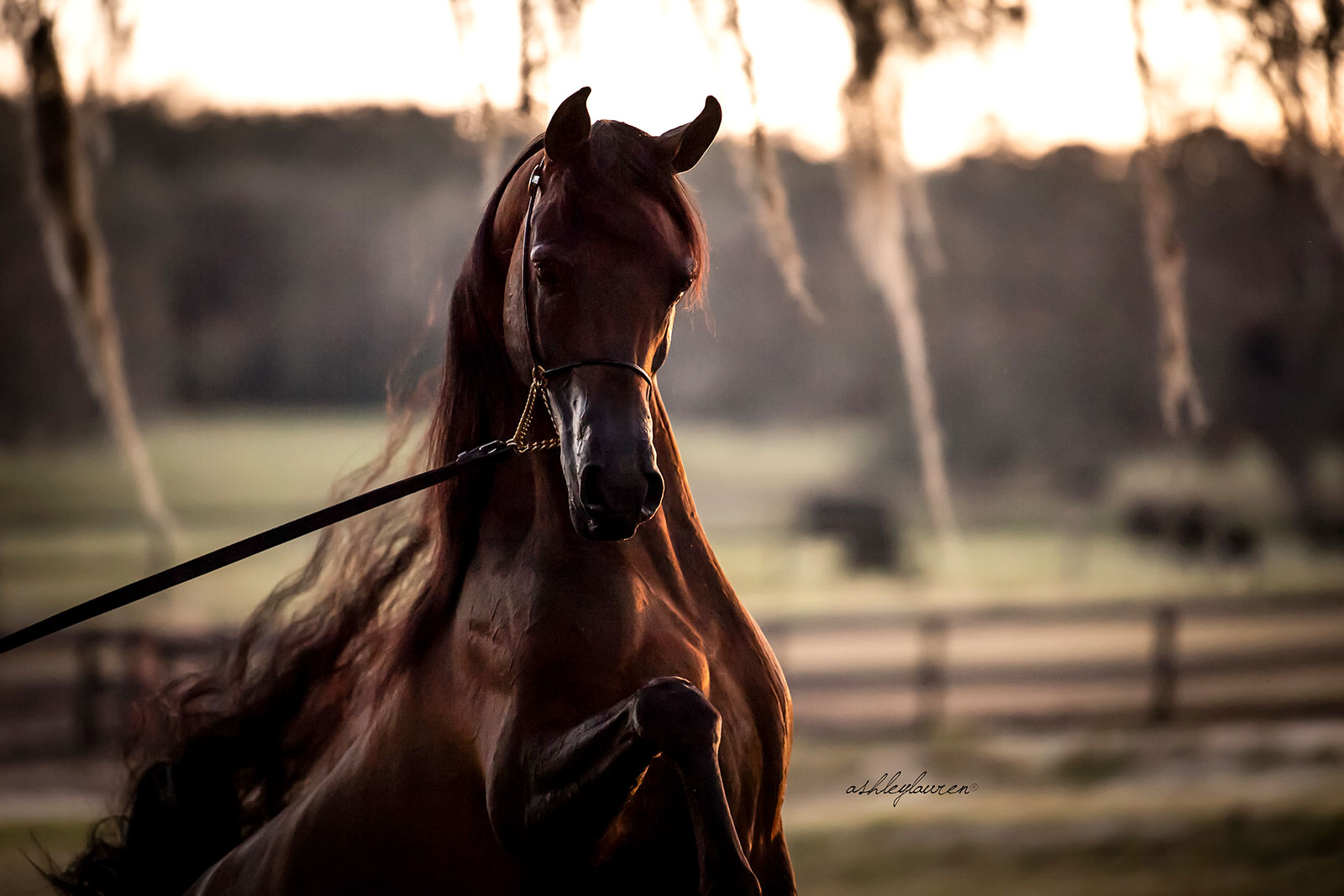By Lee S. Dougherty
As featured in the Winter 2024 issue of Arabian Horse World.
Daniel Gainey made a name for himself as a salesman, then CEO of Jostens, Inc., the famous class ring company. The grandson of Irish immigrants, he knew hard work from childhood, and through determination, he rose from the boomtown of Bemidji to power and prestige. In 1939, he received an Arabian colt as a gift from the company’s salesmen, and from that moment, his heart belonged to horses.
He brought his work ethic to his new passion, buying 180 acres near Owatonna, Minnesota, and throwing himself into learning about the breed. Gainey met and cultivated relationships with top Arabian breeders, learning something from every breeder and horse. He planned to establish a breeding program on his new property and, with that view, selected the best mares he could find that fit his expectations and specifications. When choosing a stallion for his mares, he looked at phenotype and pedigree to locate the individual that he thought would add strength to each mare, as well as adding something extra special: all this while striving for that elusive perfection.
Perfection must be the inevitable beacon light in any undertaking which hopes to achieve worthwhile results. Personal ownership, prejudice, even that great quality, loyalty, must not be the guiding hand in a breeding program. Perfection is what we are after. - Daniel C. Gainey
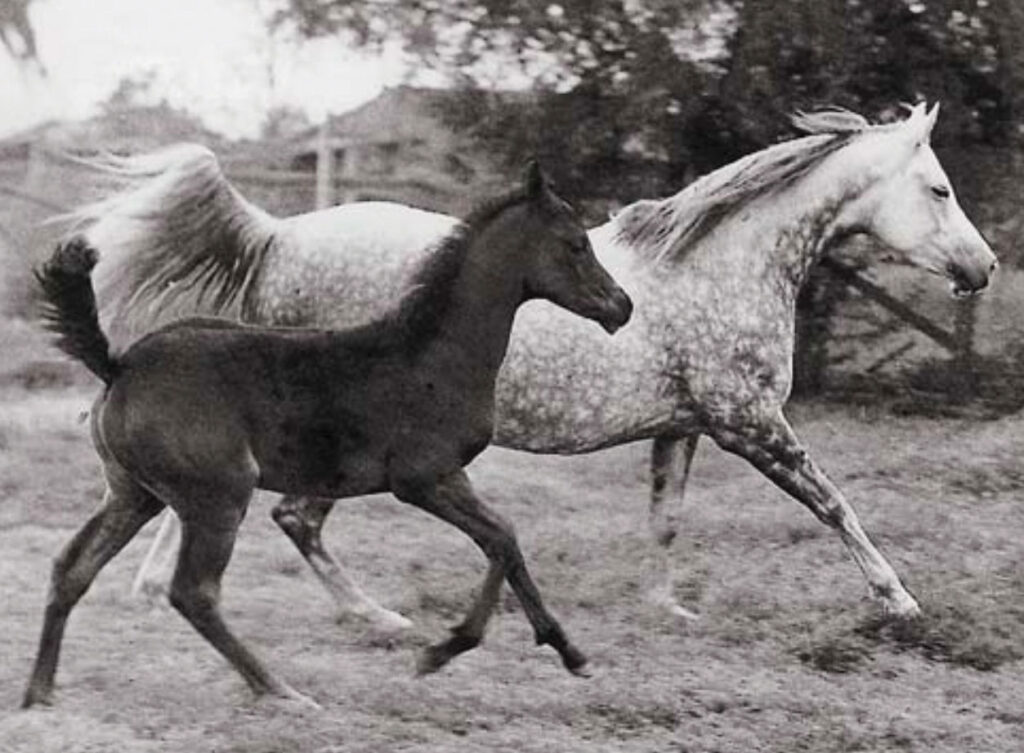
Ferzon with his dam Fersara.
Among the first mares Gainey purchased was Mirage’s daughter Rageyma, who had already borne one foal, Geym, by Raffles and was expecting another from him when she came to Minnesota. That foal, Gajala, became the “cornerstone” mare of the Gainey Arabians. Balena and Ralouma, daughters of Raseyn, joined Rageyma at Owatonna. Ralouma, in foal to Mirage’s son Rifage when she arrived, bored the colt Gaysar, the first purebred Arabian foal registered in Minnesota. Gaysar later
sired two champion colts by Rageyma, yet his beauty and success were but a foretaste of treasures yet to come.
In 1953, Mr. Gainey found his ideal stallion as a foal in Frank McCoy’s stables. This beautiful, elegant colt, Ferzon, had been sired by Ferneyn out of Fersara. After a year’s persuasion, Mr. Gainey paid Mr. McCoy $10,000, then an unheard-of price for a yearling colt, thus securing Ferzon’s peerless beauty for the Gainey breeding program.
Over his long life, Ferzon sired 251 purebred Arabian horses, including some of the most classically beautiful in the world. A 1974 AHW advertisement proclaimed Ferzon “the Greatest Living Herd Sire,” and with prizewinners like triple National Champion Gai Parada+++ among his offspring, this was no idle boast.
Ideas are born, problems are solved, and personal growth is achieved. - The Gainey Motto
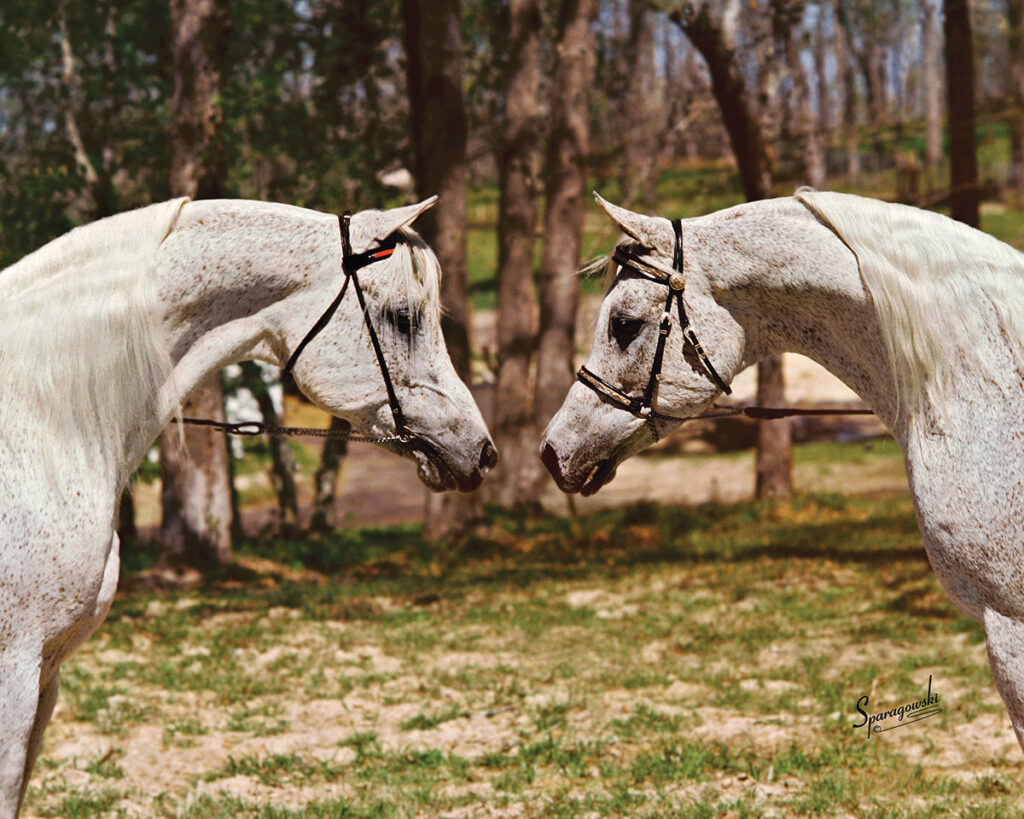
Ferzon and his son, Gai Parada+++.
Like many wealthy people, Daniel Gainey supported the causes he favored. As an active anti-Communist and contributor to Republican campaigns, he enjoyed the friendship of Presidents Eisenhower and Nixon. Upon occasion, Gainey’s passions for politics and Arabian horses collided, as when he and his wife were among the guests at a 1969 state dinner honoring the Shah of Iran. As Mrs. Gainey told the story, the Shah told her husband, “I hear you have Arabian horses.” Gainey’s rejoinder: “And they’re better than yours.”
As the Gainey Arabian program grew, the family expanded west. They bought a ranch in Scottsdale, home of the All-Arabian Horse Show, and entertained lavishly at their Moorish-style home there. The house is now the Daniel C. Gainey Estate Club, part of a luxury development begun in the 1980s when the family sold the 640-acre ranch. In 1962, the Gaineys established a second western property in Santa Ynez, California, eventually consolidating their Arizona and Minnesota herds on 1,800 acres. Most of the herd was dispersed in 1995, and the farm is now home to the Gainey Vineyard and winery. Gainey Vineyard was founded by Dan J. Gainey, grandson of Daniel C. Gainey.
As for the Owatonna acreage where it all began, Mr. Gainey bequeathed the property to the University of St. Thomas upon his death in 1979. Besides world leaders and jet-setters, Gainey counted among his friends Monsignor Terrence Murphy, president of St. Thomas University from 1966 to 1991. He was also a staunch and generous supporter of his alma mater, Hamline University, originating the alumni fund challenge in 1957. Mr. Gainey served on the University of Minnesota Board of Regents for 34 years and founded the Minnesota Private College Fund in 1951. The University of St. Thomas awarded an honorary doctorate to Mr. Gainey in 1974.
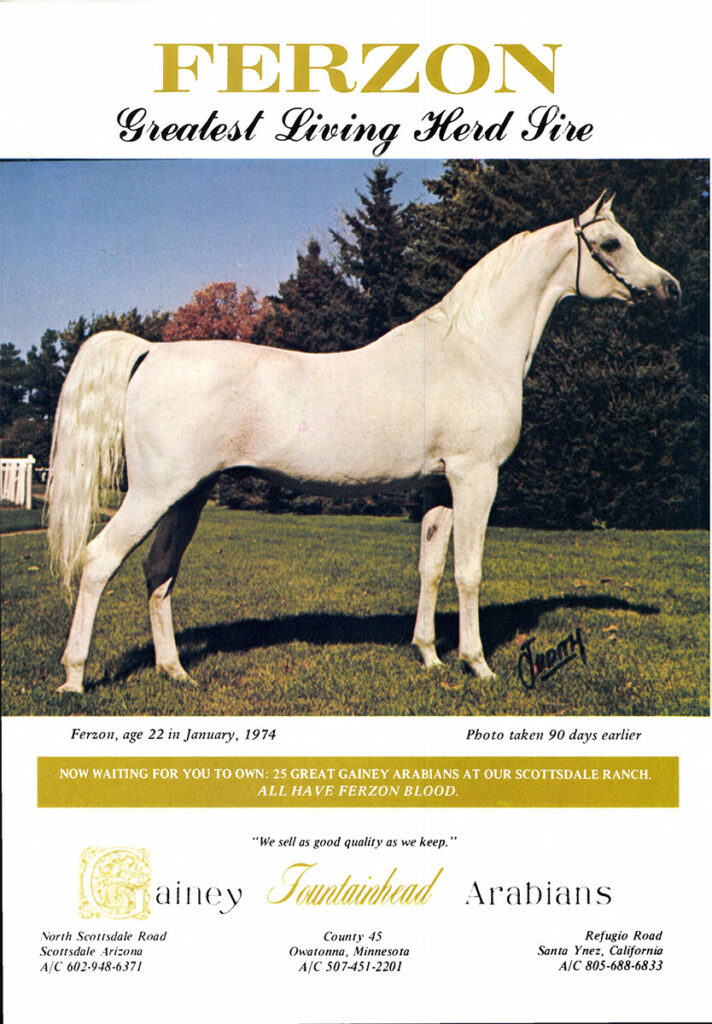
1974 Arabian Horse World Advertisement of 22-year-old Ferzon.
A horse is meant for a man to ride. Sunset and sunrise, the glistening snow of winter with fences, half inundated with white, the flowers that grow in the spring, the people passing by—all are more beautiful and wonderful if you’re mounted on a good horse. - Daniel C. Gainey
Of Gainey’s golden legacy, Jimmie Dean perhaps said it best. The longtime manager at Selby Stud said, “The most significant thing Dan C. Gainey did for the Arabian breed was to leave behind a ranch full of Gainey horses. He established quality and refinement as the Gainey trademark. He fixed a type.” Gainey was frequently referred to as a breeders’ breeder since the horses he bred became the foundations of numerous other breeding programs. The Gainey Fountainhead Arabian Program provided foundation breeding stock for programs on four continents, and the Gainey Arabian sub-strain is the only sub-strain to carry a man’s name.
Gainey had the vision and courage to line breed for desirable traits, and his drive for perfection was ruthless enough that it allowed him to cull any individuals from the Gainey breeding program that did not meet his standards. He could thus produce horses that would breed true to type for generations to come. According to Robin F. Gainey, daughter-in-law of D. C. Gainey and co-founder of Gainey Vineyard, Mr. Gainey was a perfectionist, “following the criteria of the Bedouins who originally bred these magnificent horses: the best in form, function, correctness, and disposition.”
It could be that Gainey knew of sire-line pedigree matching from studying the work of famed Thoroughbred breeder and trainer Federico Tesio of Italy. Author John Randall called Tesio “the only genius ever to operate in the breeding world” and “the greatest single figure in the history of Italian racing.” Based on available evidence, I believe that Gainey and Frank McCoy, along with other greats, had read and utilized Tesio’s breeding theories, just as Norman Hall had. Ferzon’s pedigree is perfectly pedigree-matched, producing that famous Gainey “look.” Musing on how a superb sire can have many unremarkable offspring, or why an ordinary mare can produce a champion, Hall suggests, “The answer may well be in the match of the bloodlines of the sire to those of the dam. The concept of pedigree matching sire lines as a way to develop champions has proven its worth over the years for all types of performance horses, including Standardbred, Thoroughbred, Quarter Horse, Arabian, and even the Tennessee Walking Horse.”
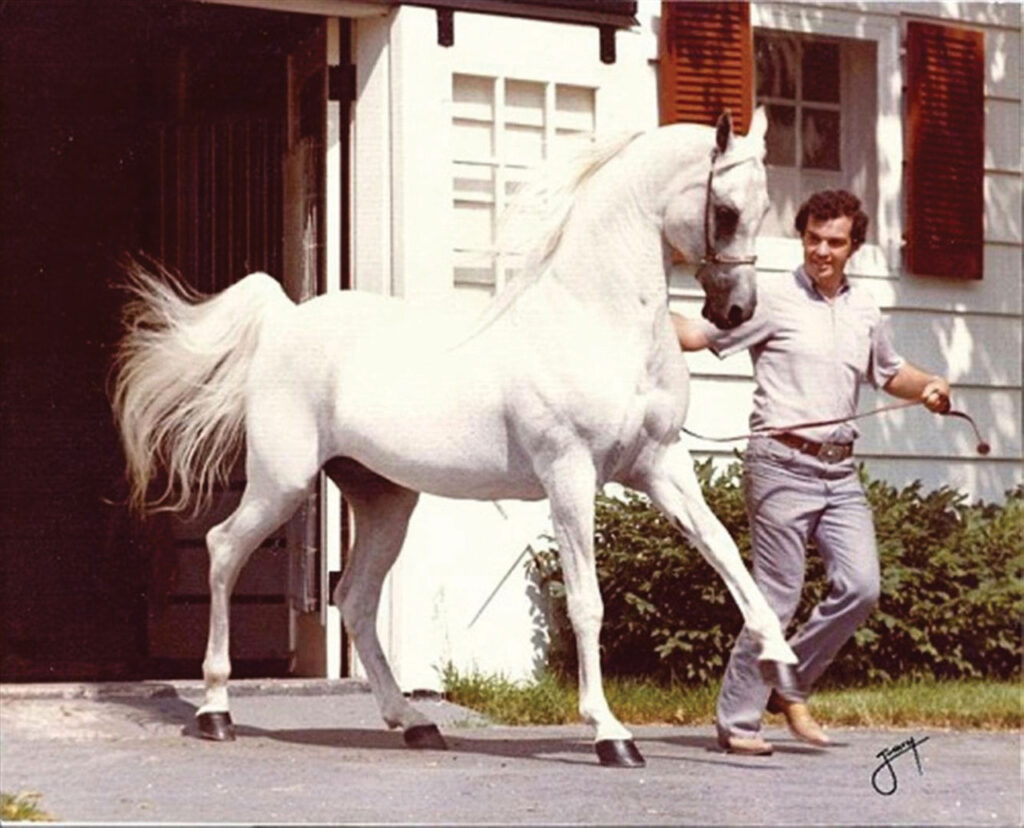
Ferzon with Mel Capp.
The Arabian horse is grace, speed, endurance, conformation, and intelligence. More—he is love, sympathy, courage, beauty, friendship, loyalty. How fortunate to own an Arabian, especially if one is wise enough to truly appreciate the relationship. - Daniel C. Gainey
In Practical Pedigrees, Norman Hall points to Thoroughbred researcher Alan Porter’s urging breeders to “delve deeply” into a pedigree to discover the underlying genetic strengths that are not readily apparent in the first few generations. As he said, “This can reveal that one particular background cross has been built up to a point where it dominates a pedigree and reaches a critical mass reinforcing vital genes to the point where they explode in the form of a dynamic performer.” Studying the pedigrees of Ferzon and other Gainey Fountainhead Arabians, one can see that Mr. Gainey put these principles into practice.
When I bought my first Arabian mare in 1977, I did not have Arabian Horse DataSource or even the Arabian Horse Stud Book, nor was I knowledgeable about Arabian pedigrees then. All I know now is that the good Lord was looking out for me because my Kemah Juleyna turned out to be a lovely Ferzon-Julep granddaughter bred by Mrs. Josephine Harris of the famed Kemah Arabian Farm. It turns out that Daniel Gainey himself had carried on considerable horse business with the Harris’ in years gone by. What luck!
I wish I had known then what I know now about a breeding program, particularly pedigree matching or the Bedouin method, in which the sire of the sire should be the grandsire of the dam. If I had, I would have bred Kemah Juleyna a lot differently. Her sire was Pompey’s Pride (Ferzon x Al-Marah Pompey’s Love). As an advertisement from 1972 said Pompey’s Pride was “bred to be a sire,” and his 109 offspring testified to that claim. Kemah Juleyna had her grandsire Ferzon’s graceful look, and I would have bred her to the great Ferzon son, Gaffezon++. It’s a shame to have let such a golden opportunity slip.
Since “imitation is the sincerest form of flattery,” great Arabian horse breeders like the late Daniel C. Gainey would undoubtedly be flattered if you imitated bits and pieces of their successful breeding programs. Gainey studied and learned from the greats before him, so why not follow the same paths, travel with, and imitate the best? Perhaps you, too, will acquire the Midas touch.




